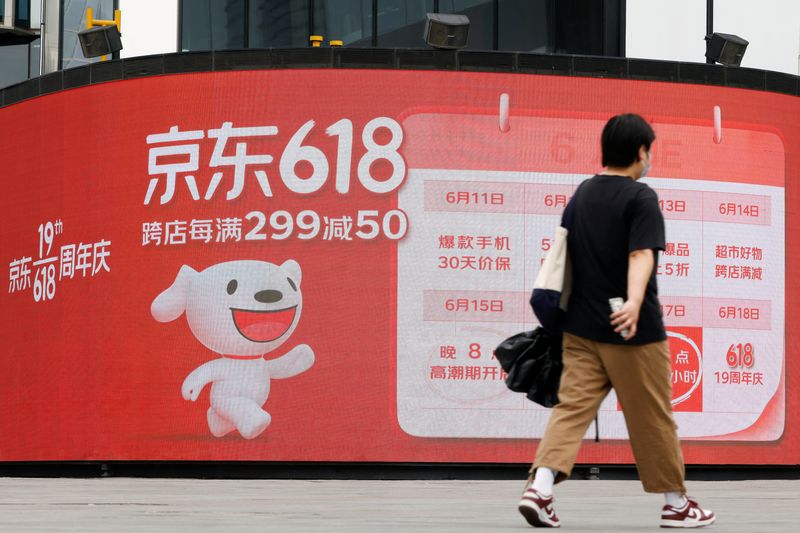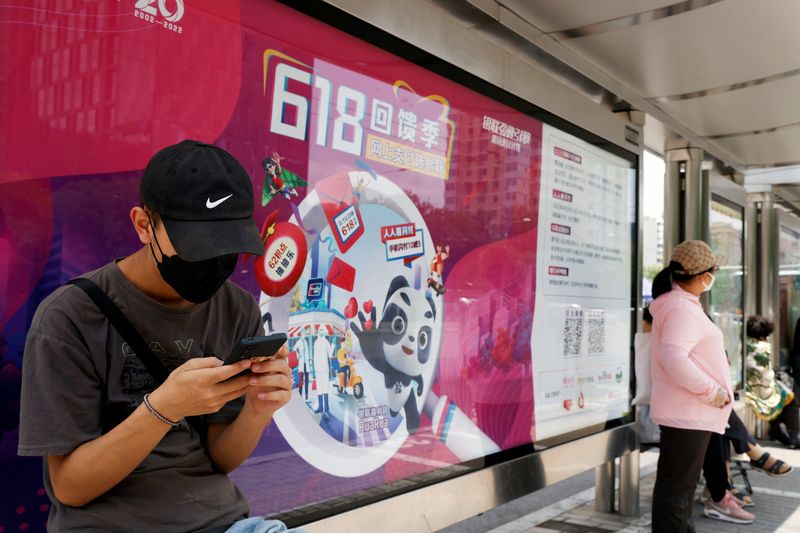By Sophie Yu and Brenda Goh
BEIJING (Reuters) -China is set to get a picture of how the country's zero-COVID-19 policy and slowing economy have impacted shoppers' urge to splurge, as e-commerce platforms gear up to report takings from the mid-year "618" shopping festival this weekend.
Held in the run-up to June 18, 618 is China's second-largest shopping event by sales after Nov. 11's Singles Day, with bargain-hunters holding off purchases in anticipation of discounts spanning a range of brands.
Last year, Alibaba (NYSE:BABA) Group Holding Ltd's Tmall, JD (NASDAQ:JD).com Inc and Pinduoduo (NASDAQ:PDD) Inc hit a combined 578.4 billion yuan ($85.89 billion) worth of 618 sales, up 26.5% from the year earlier, showed data from Syntun.
But the world's second-largest economy has in the last three months been hobbled by government efforts to combat repeated waves of COVID-19 that has seen dozens of cities impose lockdown measures of varying intensity, in turn curtailing spending, impacting livelihoods and heavily disrupting supply chains.
Many cities eased curbs in June and have said they want to stimulate consumption to revive the economy, with incentives including vouchers, subsidies for car buyers and digital yuan payments.
Acknowledging that brands have been hit by the pandemic, Alibaba and JD.com are offering merchant support measures, such as pledging to speed up transfers of pre-sale deposits to help merchants' liquidity.
They are also encouraging brands to offer their biggest-ever discounts in hope of spurring spending, with JD.com stipulating that shoppers can get 50 yuan off for every 299 yuan they spend. Alibaba has a similar offer. Vendors foot the bill for these discounts.
Some companies and agents told Reuters, however, they planned to participate less in discounting this year, because they or their clients were unable to afford it.
Fang Jianhua, founder and chairman of IDG Capital and Alibaba-backed clothing brand Inman Apparel, penned an article on WeChat last month lamenting how retailers especially in Shanghai were suffering in the current environment from lost sales and that he planned to "lie flat" for 618 - a Chinese expression of inaction.
Rather than discounts, Fang plans to "concentrate on how to use our products and services to build up emotional connections with millions of customers," he said without elaborating.
Still, the event is seeing a trend of retailers from pasta maker Barilla to shampoo brand Ryo offering "stock up" packages, containing what would constitute bulk orders of their products.
Many shoppers in cities such as Shanghai and Beijing which have experienced pandemic lockdown measures have rushed to stock up on food and daily necessities even after movement restrictions eased due to fear of lockdown happening again.

The 618 event was conceived by JD.com in 2004 to celebrate its anniversary.
($1 = 6.7344 Chinese yuan renminbi)
